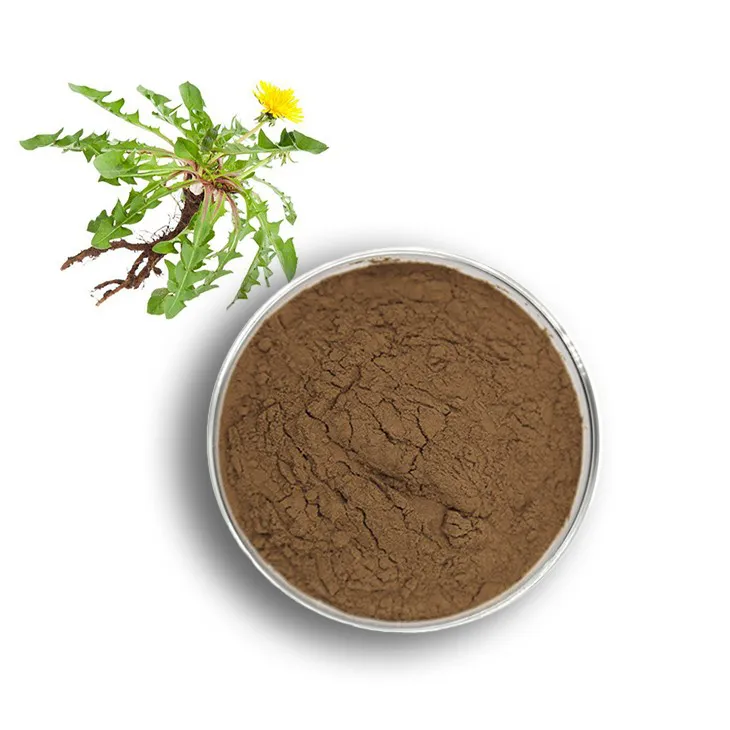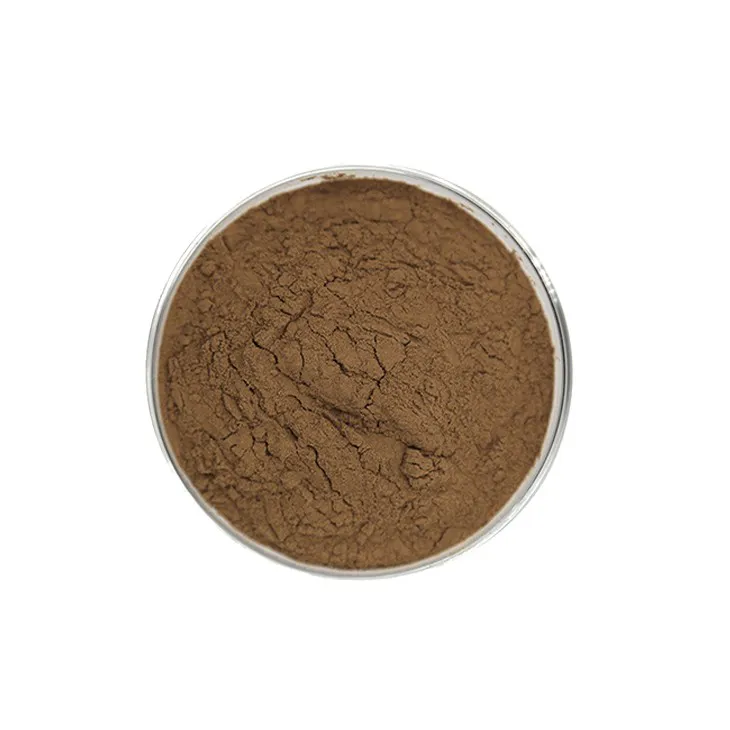- 0086-571-85302990
- sales@greenskybio.com
What is dandelion root extract? Definition, types, history and nutritional value.
2024-12-14

1. Introduction
Dandelion Root Extract has been gaining significant attention in recent years due to its potential health benefits. It is derived from the roots of the dandelion plant, scientifically known as Taraxacum officinale. This plant is widely distributed across the globe and has a long history of use in various cultures.

2. Definition
Dandelion Root Extract is a concentrated form of the bioactive components present in the dandelion root. It is obtained through extraction processes that isolate and purify the valuable substances within the root. These substances include a variety of compounds such as flavonoids, phenolic acids, and terpenes, which contribute to its potential medicinal and nutritional properties.

3. Types of Dandelion Root Extract
3.1. Based on Extraction Methods
- Solvent - Based Extraction: This is one of the most common methods. Organic solvents like ethanol or methanol are used to dissolve the bioactive compounds from the dandelion root. The resulting extract contains a wide range of compounds. However, it is important to ensure that all solvent residues are removed to meet safety standards.
- Water - Based Extraction: Water can also be used as a solvent. This method is considered more natural and is often preferred in traditional medicine preparations. Water - based extracts may contain different proportions of compounds compared to solvent - based ones, and they are generally safer in terms of potential solvent - related toxicity.
- Supercritical Fluid Extraction: This advanced method uses supercritical fluids, typically carbon dioxide, under high pressure and specific temperature conditions. It offers the advantage of being more selective in extracting specific compounds, resulting in a high - quality extract with a relatively pure composition of desired bioactive substances.
3.2. Based on Intended Uses
- Medicinal - Grade Extract: These extracts are prepared with strict quality control to meet pharmaceutical standards. They are often used in the production of dietary supplements or herbal medicines for treating various health conditions such as digestive disorders, liver problems, and inflammation.
- Cosmetic - Grade Extract: Dandelion root extract is also used in the cosmetic industry. In this case, the extract is formulated to target skin - related benefits such as antioxidant protection, skin hydration, and anti - aging effects. Cosmetic - grade extracts may have different processing and purification steps to ensure compatibility with skin and cosmetic formulations.
- Food - Grade Extract: Some dandelion root extracts are designed for use in the food industry. They can be added to functional foods or beverages to enhance their nutritional value. Food - grade extracts must comply with food safety regulations and are often standardized for specific nutrients or bioactive compounds.

4. History of Dandelion Root Use
- The use of dandelion roots in traditional medicine dates back centuries. In ancient Greek, Roman, and Chinese medicine, dandelion was highly regarded for its medicinal properties. The Greeks and Romans used it to treat various ailments including digestive problems, liver disorders, and skin diseases.
- In traditional Chinese medicine, dandelion roots were used as part of herbal formulations to clear heat, detoxify the body, and promote digestion. The knowledge of its uses was passed down through generations, and it remains an important part of the Chinese herbal medicine repertoire today.
- Native American tribes also had their own uses for dandelion roots. They were used for medicinal purposes, as well as a food source. The roots were often dried and ground into a powder or made into a decoction for treating ailments such as kidney problems and rheumatism.
- During the Middle Ages in Europe, dandelion continued to be used in folk medicine. It was considered a valuable herb for maintaining good health, especially for liver and digestive health. As modern medicine developed, the use of dandelion root extract has been re - explored and studied for its potential scientific basis in treating various health conditions.
5. Nutritional Value of Dandelion Root Extract
5.1. Vitamins
Dandelion root extract contains several vitamins that are essential for the body's normal functioning. Vitamin A, for example, is present in the form of carotenoids such as beta - carotene. Vitamin A is crucial for maintaining good vision, healthy skin, and a strong immune system. Additionally, dandelion root extract may also contain small amounts of vitamins C, E, and some B - vitamins. Vitamin C is an antioxidant that helps protect cells from damage, while vitamin E also has antioxidant properties and is important for skin health. B - vitamins play a vital role in energy metabolism and nerve function.
5.2. Minerals
- One of the significant minerals found in dandelion root extract is potassium. Potassium is essential for maintaining proper heart function, regulating blood pressure, and ensuring normal muscle contractions. It also helps in the balance of fluids within the body.
- Calcium is another mineral present in dandelion root extract. Calcium is well - known for its role in building and maintaining strong bones and teeth. It also plays a part in muscle function, nerve transmission, and blood clotting.
- Iron is also found in dandelion root extract. Iron is crucial for the production of hemoglobin in red blood cells, which is responsible for transporting oxygen throughout the body. Adequate iron intake helps prevent anemia.
5.3. Antioxidants
- Dandelion root extract is rich in antioxidants. Flavonoids, such as luteolin and Quercetin, are among the major antioxidant compounds present. These antioxidants work by neutralizing free radicals in the body. Free radicals are unstable molecules that can cause damage to cells, leading to various diseases such as cancer, heart disease, and aging - related disorders.
- Phenolic acids, another group of antioxidants in dandelion root extract, also contribute to its antioxidant activity. They help protect the body from oxidative stress, which is an imbalance between the production of free radicals and the body's ability to detoxify them.
6. Potential Health Benefits
6.1. Digestive Health
- Dandelion root extract has been traditionally used to improve digestion. It can stimulate the production of digestive enzymes, which helps break down food more efficiently. This can lead to better absorption of nutrients from the diet.
- It also has a mild laxative effect, which can help relieve constipation. The fiber content in dandelion root extract may contribute to promoting regular bowel movements.
- Furthermore, it may help soothe digestive discomfort such as bloating and indigestion. By improving the overall function of the digestive system, it can enhance the body's ability to process and utilize food.
6.2. Liver Health
- The liver is a vital organ responsible for detoxification, metabolism, and storage of nutrients. Dandelion root extract has been shown to have a beneficial effect on liver health. It can help stimulate liver function and promote the production of bile, which is essential for the digestion and absorption of fats.
- Studies suggest that dandelion root extract may also protect the liver from damage caused by toxins. It can enhance the liver's antioxidant defense system, reducing the risk of liver diseases such as hepatitis and cirrhosis.
6.3. Anti - Inflammatory Effects
- The antioxidants present in dandelion root extract, such as flavonoids and phenolic acids, have anti - inflammatory properties. Chronic inflammation is associated with many diseases, including arthritis, heart disease, and diabetes.
- Dandelion root extract may help reduce inflammation in the body by suppressing the production of inflammatory mediators. This can potentially relieve symptoms associated with inflammatory conditions and may also play a role in preventing the development of chronic diseases.
6.4. Immune System Support
- The vitamins and minerals in dandelion root extract, along with its antioxidant content, can contribute to a healthy immune system. Vitamin C, for example, is known for its immune - boosting properties.
- By protecting cells from oxidative damage and providing essential nutrients, dandelion root extract may help the immune system function more effectively, enabling the body to better defend against infections and diseases.
7. Precautions and Considerations
- Although dandelion root extract is generally considered safe for most people, it may cause allergic reactions in some individuals. Those with known allergies to plants in the Asteraceae family (which includes dandelions) should exercise caution when using dandelion root extract products.
- If you are taking medications, especially those that are metabolized by the liver or affect blood pressure, it is advisable to consult a healthcare provider before using dandelion root extract. There may be potential interactions between the extract and medications.
- Pregnant and breastfeeding women should also be cautious when considering the use of dandelion root extract. While there is limited evidence on its safety during pregnancy and lactation, it is best to err on the side of caution and seek medical advice.
8. Conclusion
Dandelion root extract is a natural and potentially valuable substance with a rich history of use in traditional medicine. It offers a range of nutritional components and has been associated with various potential health benefits. However, more research is needed to fully understand its mechanisms of action and to ensure its safety and efficacy in different populations. As with any natural supplement, it is important to use it responsibly and under the guidance of a healthcare professional if necessary.
FAQ:
What are the main bioactive compounds in dandelion root extract?
Dandelion root extract contains bioactive compounds such as polyphenols, flavonoids, triterpenes, and sesquiterpene lactones. These compounds contribute to its potential health - promoting properties, for example, polyphenols and flavonoids are known for their antioxidant effects.
How is dandelion root extract made?
The extraction process typically involves drying the dandelion roots first. Then, solvents like water, ethanol or a combination of them are used to extract the active components from the roots. After extraction, the solvent is removed through evaporation or other techniques, leaving behind the concentrated dandelion root extract.
What are the traditional uses of dandelion root extract in medicine?
In traditional medicine, dandelion root extract has been used for various purposes. It was often used to support liver and digestive health. For example, it was believed to help with liver detoxification and improving digestion by increasing bile production. It was also used to treat urinary tract infections, as it may have a diuretic effect, helping the body to get rid of excess water and toxins.
Can dandelion root extract help with weight loss?
There is some evidence suggesting that dandelion root extract may be beneficial for weight loss. Its diuretic properties can lead to a temporary reduction in water weight. Additionally, some studies indicate that it may affect metabolism, potentially helping the body to burn more calories. However, more research is needed to fully understand its role in weight loss and it should not be considered a sole solution for losing weight.
Are there any side effects of using dandelion root extract?
While dandelion root extract is generally considered safe for most people when used in moderation, some individuals may experience side effects. It may cause allergic reactions in people who are sensitive to dandelions. Also, due to its diuretic effect, excessive use may lead to dehydration or electrolyte imbalances. Pregnant and breastfeeding women should consult a healthcare provider before using dandelion root extract.
Related literature
- The Nutritional and Medicinal Properties of Dandelion (Taraxacum officinale)"
- "Dandelion Root Extract: A Review of its Phytochemistry and Therapeutic Potential"
- "Traditional Uses and Modern Research on Dandelion Root Extract"
- ▶ Hesperidin
- ▶ Citrus Bioflavonoids
- ▶ Plant Extract
- ▶ lycopene
- ▶ Diosmin
- ▶ Grape seed extract
- ▶ Sea buckthorn Juice Powder
- ▶ Fruit Juice Powder
- ▶ Hops Extract
- ▶ Artichoke Extract
- ▶ Mushroom extract
- ▶ Astaxanthin
- ▶ Green Tea Extract
- ▶ Curcumin
- ▶ Horse Chestnut Extract
- ▶ Other Product
- ▶ Boswellia Serrata Extract
- ▶ Resveratrol
- ▶ Marigold Extract
- ▶ Grape Leaf Extract
- ▶ New Product
- ▶ Aminolevulinic acid
- ▶ Cranberry Extract
- ▶ Red Yeast Rice
- ▶ Red Wine Extract
-
Centella Asiatica Extract
2024-12-14
-
Dandelion Root Extract
2024-12-14
-
Beetroot Powder
2024-12-14
-
Black Garlic Extract
2024-12-14
-
Rose Hip Extract
2024-12-14
-
Milk Thistle Extract
2024-12-14
-
Lemon Juice Powder
2024-12-14
-
Phellodendron Extract
2024-12-14
-
Okra Extract
2024-12-14
-
Eucommia Ulmoides Extract
2024-12-14




















